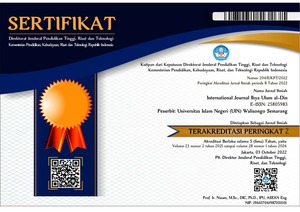Islam, State, and Nationalism in Brunei Darussalam, India, Indonesia, and Malaysia: A Comparative Perspective
DOI:
https://doi.org/10.21580/ihya.21.2.4832Keywords:
Colonized countries, Islam, NationalismAbstract
Islam has comprehensive roles in some aspects of human activity. It enlarged from theological aspect to political aspects. Some former colonized countries where Islam was coexisted, this religion became an embryo of nationalist movements during colonization era. This essay scrutinizes the role of Islam in escalating nationalism during colonization era and it relation with the states in post colonization era in four former colonized countries namely Brunei Darussalam, India, Indonesia, and Malaysia. By using comparative method, the essay researched some main literature (library research) related to Islam and nationalism. It was founded that Islam has significant roles in nationalist movement in the four analyzed countries through several channels. Meanwhile, in the post-independence era, the relation between Islam and state system are variably. In India, Islam is separated from state system (secular). In contrast, Islamic ideology became the main sources of state system in Brunei Darussalam (adopted entirely) and Malaysia (adopted partially). Then, Islam in Indonesia seems like “a gray zone” because the country does not using Islamic law but still adopting Islamic thoughts in several cases.
Downloads
References
Andaya, B.W., and L.Y. Andaya. 1982. A History of Malaysia. Houndmills. Basingstoke, UK: Macmillan.
Anderson, Benedict. 2006. Imagined Communities, Reflection on the Origin and Spread Nationalism. New York: Verso.
Center, Pew Research. 2015. The Future of World Religions: Population Growth Projections, 2010-2050. Retrieved from http://www.pewforum.org/2015/04/02/religious-projections-2010-2050/.
Geertz, Clifford. 1968. Religion of Java. Glencoe, IL: Free Press.
Hefner, Robert, and H Patricia. 1997. Islam in an Era of Nation-States. Politics and Religious Renewal in Muslim Southeast Asia. Honolulu: University of Hawaii Press.
Houben, V.C.J. 2003. “Southeast Asia and Islam.” In ANNALS, AAPSS, 588, , 65–97.
Hussainmiya, B.A. 2003. “Resuscitating Nationalism: Brunei under the Japanese Military Administration (1941-1945).” Senri Ethnological Studies 65: 273–300.
Kroef, J.S.V.D. 1958. “The Role of Islam in Indonesian Nationalism and Politics.” The Western Political Quarterly 11(1): 33–54.
Mahmood, T. 2011. Religion and the Secular State: Indian Perspective. India: National Report.
Mansurnoor, A. 2008. “Islam in Brunei Darussalam: Negotiating Islamic Revivalism and Religious Radicalism.” Islamic Studies 47(1).
Means, G.P. 1969. “The Role of Islam in the Political Development of Malaysia.” Comparative Politics 1(2): 264–84.
Muller, D.M. 2018. Islamic Authority and the State in Brunei Darussalam. Kyoto Review of Southeast Asia. Retrieved from https://kyotoreview.org/issue-23/islamic-authority-and-the-state-in-brunei-darussalam/.
Robson, S. O. 1981. “Java at the Crossroads.” Bijdragen tot de Indische Taal-, Land- en Volkenkunde 137(2/3): 259–92.
Rochmat, A.M. 2017. A Lesson from Indonesia: Formulating Islam and Nationalism. Retrieved from http://www.nu.or.id/post/read/78004/a-lesson-from-indonesia-formulating-islam-and-nationalism-.
Rodriguez, E.B. 2017. “The Origins of Muslim Nationalism in British India.” JAH 6(5): 55–65.
Syadzali, M. 1993. Islam Dan Tata Negara: Ajaran, Sejarah, Dan Pemikiran (Islam and State: Thought, History, and Ideology). Jakarta: Universitas Indonesia Press.
Downloads
Published
How to Cite
Issue
Section
License
By submitting an article to the journal, the author(s) agree to transfer the published article's copyright to the journal, which will act as the publisher. This means the journal will have the right to publish the article in various forms, including reprints. The journal will maintain the publishing rights to the published articles.
This work is licensed under Creative Commons Attribution-ShareAlike 4.0 International License.
In line with the license, authors and third parties (readers, researchers, and others) are allowed to share and adapt the material. In addition, the material must be given appropriate credit, provided with a link to the license, and indicated if changes were made. If authors remix, transform or build upon the material, authors must distribute their contributions under the same license as the original.



